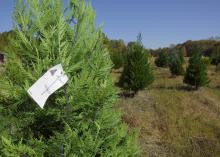Information Possibly Outdated
The information presented on this page was originally released on November 19, 2020. It may not be outdated, but please search our site for more current information. If you plan to quote or reference this information in a publication, please check with the Extension specialist or author before proceeding.
Christmas tree demand is pandemic-proof
CHUNKY, Miss. -- The COVID-19 pandemic has disrupted countless traditions in 2020, but it will not keep living rooms across Mississippi from featuring Christmas decor, nor will it deter customer demand for fresh trees.
In fact, business is booming at farms that have opened for the season, said Southern Christmas Tree Association President Michael May.
May, one of 27 Mississippi Christmas tree suppliers who are members of the association, runs Lazy Acres in Newton County. The agritourism destination’s pumpkin patch opened earlier this year, and tree sales begin there on Nov. 21.
“We strictly do choose-and-cut at our farm, but I know some growers who allow pretagging, and they are seeing a significant uptick in customers,” May said. “This was the best year ever for our pumpkin patch.”
May modified safety protocols at his farm for visitors to the pumpkin patch, and those precautions will remain in place to protect tree customers during their visits.
“Some of our growers are not doing wagon rides to their fields and are letting everyone walk to them instead,” he said. “We have some additional handwashing stations here at the farm. We’re encouraging families to visit and enjoy the experience of getting a tree, but we’re recommending that they wear masks and socially distance.”
Like May, John Kushla, professor and forestry specialist with the Mississippi State University Extension Service, anticipates a strong retail season this year despite the pandemic and a steady diet of severe weather across the state for much of 2020.
“I think our growers in Mississippi fared well through the Easter tornadoes and hurricanes this year,” Kushla said. “The hurricanes damaged some crops in southern Alabama and Louisiana. Broken trees had to be cut down, but those blown over could be staked and salvaged.”
Customers can expect to pay $10 to $15 a foot for their tree this year. Customers can find their closest Christmas tree farm by visiting the Southern Christmas Tree Association website at http://www.southernchristmastrees.org/.
“Those growers who sustained storm damage this year may charge more for trees to recoup losses, unless they can claim them on crop insurance,” Kushla said. “I would encourage customers to contact growers before visiting the farm. Since supply may be short, customers should place orders for a real tree now, or call ahead to make sure there are trees available to purchase.”
Leyland cypress is the most popular species association growers produce. It produces a full tree and is less aromatic than other species. The next bestselling tree is Blue Ice, which is a variety of the Arizona cypress. Precut, imported trees are usually Fraser fir from the mountains of the Carolinas or Tennessee.
“It has been increasingly difficult for our growers down here to acquire Fraser fir for resale,” Kushla said. “This has compounded the shortage of real Christmas trees.”
Kushla said Southern Christmas Tree Association members, who are primarily in Mississippi, Louisiana and Alabama, will probably sell on the order of 32,000 to 34,000 trees this season.
For tips on live Christmas tree care, visit the MSU Extension for Real Life blog.



